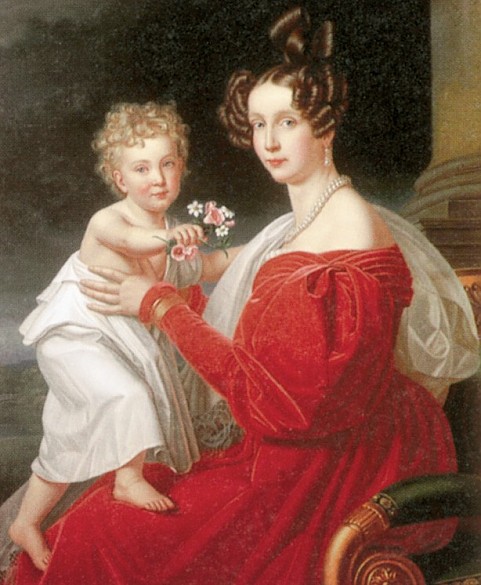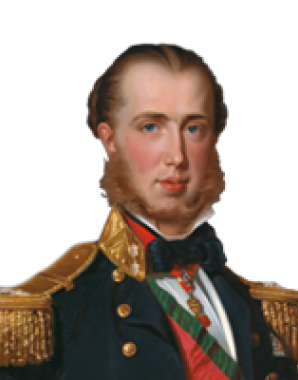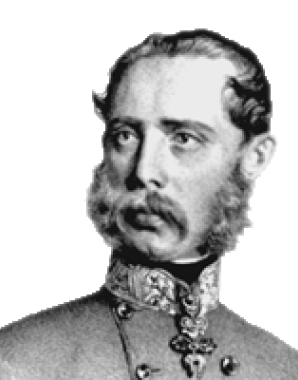Sophie and the hopes of the dynasty
Sophie fulfilled the expectations placed in her of producing male offspring for the dynasty.
The daughter of King Maximilian I of Bavaria (1756–1825) and his second wife Karoline of Baden (1776–1841), Sophie Friederike Dorothea Wilhelmine was born on 27 January 1805 in Munich together with her twin sister Maria Anna (1805–1877).
Outstandingly intelligent and strong-willed, she was bitterly disappointed when dynastic considerations led to an arranged marriage with Archduke Franz Karl, the unremarkable younger son of Emperor Franz II (I) in 1824. Sophie was extremely ambitious, and most of her sisters married ruling kings and princes – her half-sister Karolina Auguste had become the fourth wife of Emperor Franz II (I) and was thus incidentally Sophie’s step-mother – while she had been assigned the emperor’s rather unprepossessing second son.
Nevertheless, at the time of her marriage it was not beyond the bounds of possibility that Sophie might eventually become empress, as Crown Prince Ferdinand, the elder brother of her husband, suffered from physical and mental shortcomings which made him unfit for imperial office. When a marriage was arranged for him to Anna Maria of Piedmont-Sardinia in 1831, Sophie initially feared that her chances of ascending to the throne would be lessened since this union could potentially have resulted in the birth of a son. However, her fears were to prove groundless, as Ferdinand’s marriage remained without issue.
The ossified structures at the Viennese Court made it difficult for the energetic and ambitious Sophie to position herself at first. The ruling emperor Franz I was elderly, and the dominant political force, State Chancellor Prince Metternich, had also passed the zenith of his career.
Sophie found a soulmate in Napoleon Franz Joseph Bonaparte, Duke of Reichstadt and son of Napoleon, who had grown up at the Viennese Court and was only six years younger than her. How far this relationship went is difficult to say with any certainty. The rumour that her second son Maximilian was fathered by the duke is however unlikely, as by this time he was already seriously ill with laryngeal tuberculosis.
Following several miscarriages Sophie finally gave birth to a son, Franz Joseph, in 1830. She went on to bear another five children, of whom three sons, Ferdinand Maximilian, Karl Ludwig and Ludwig Viktor, reached adulthood.
The archduchess groomed her sons, in particular her firstborn, Franz Joseph, as the future hopes of the dynasty, laying great emphasis on an upbringing in keeping with dynastic tradition. Rejecting the principles of the Enlightenment and liberal tendencies, she agitated for a strengthening of monarchical and dynastic ideals. Sophie was a devout Catholic and adherent of the anti-liberal clericalist tendency, bitterly opposed to the Josephinian state church and seeing in a reinvigorated Catholic church an important cornerstone in the fight against revolutionary tendencies among the common people.
Step by step she strove to consolidate her position both at Court, and with her force of character became the dominant figure in the family. She opposed State Chancellor Metternich, who found in her one of his few serious opponents in the dynasty. She accused him of wanting ‘to run the Monarchy without the Emperor and with a simpleton [i.e., Ferdinand] as the representative of the Crown’, the very antithesis of her ideals of dynastic monarchy. Outsiders dubbed Sophie ‘the only man’ in the imperial family.
















